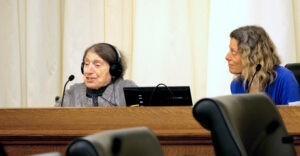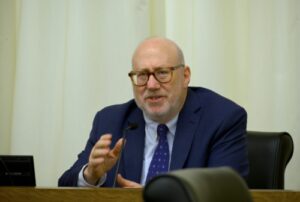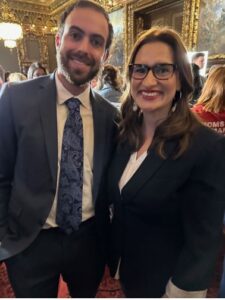Nearly five months after starting, the Minnesota legislature wrapped up its legislative session on Monday, which was seen as so transformative, Secretary of State Steve Simon said a session like this comes along a “couple of times a century.”
“[Legislators] made Minnesota better for families and children – especially children – and working people and poor folks and immigrants,” said Beth Gendler, the executive director of Jewish Community Action. “It has transformed our state for the better.”
Minnesota Democrats had the “trifecta” – control of the Minnesota House, Senate, and governor’s office for the first time since 2014.
“I think that we like so many other organizations doing work in these progressive spaces, we’re, able to build on the momentum that we’ve been working hard on in these past couple of years to really leverage having the trifecta government,” said NCJW Minnesota Executive Director Erica Solomon.
The single-party control meant the passage of bills that codified abortion access and expanded it in Minnesota, made Minnesota a sanctuary state for transgender people, legalized recreational marijuana use, universal school lunches, and more.
“Nothing is easy at the Capitol,” said Ethan Roberts, the JCRC’s deputy executive director and the director of the Twin Cities Jewish Community Government Affairs Program. “I know maybe this session, it seems like things are easy because so many good things happen, but it isn’t easy. The deadlines were very aggressive. It required a lot of begging for time [to meet] to get things done.
The session was particularly beneficial for many priorities across the Jewish community that Gendler, Solomon, Roberts, and so many others were working on.
Holocaust, genocide education mandate
As part of the education omnibus bill that passed the House and the Senate last week, the Holocaust and Indigenous genocide education mandate will be part of the state’s education curriculum. The mandate, which enjoyed bipartisan support through the House and Senate committee process, was a major priority of the JCRC.

99-year-old Holocaust survivor Dora Zaidenweber, with daughter Rosanne(R), testifies at the Minnesota House Education Finance Committee hearing on a bill that would mandate Holocaust and genocide education. (Photo by Lev Gringauz/TC Jewfolk).
Roberts said the coalition that helped put the bill together included the Center for Holocaust and Genocide Studies (CHGS) at the University of Minnesota, and experts like Laura Zelle, the director of Holocaust education at JCRC, educator and former U.S. Holocaust Memorial Museum staff member Kristin Thompson, and Prof. Gabriela Spears-Rico – an expert in Native American Studies and Critical Indigenous Studies and a CHGS board member.
The bill didn’t get introduced until nearly two months into the session, which Roberts said is later than many others do.
“Rep. Frank Hornstein was so helpful because he shopped around this language that we were using with his colleagues. There isn’t unanimity within the indigenous community as to … what language you use,” Roberts said, using the example of indigenous or native. “We at the JCRC would never presume to be experts on that. A good rule of thumb is first, do no harm.
“We spent so much time trying to get it right on the front end. When you’re talking about genocide, you really want to get the language right.”
This piece of the education bill establishes a task force, led by two co-chairs and all over overseen by the commissioner of education. Zelle said at a March 23 House committee hearing, that teachers from the middle school and high school levels would be on this committee with a background in English Language Arts, Social Studies and student representation.
“The group’s two main tasks would be to build the repository of resources and identify professional development opportunities for teachers to self-select the opportunities and then be supported with funds,” she said. “Gathering the most current updated curated resources and securing funding for the teacher training is incredibly necessary to empower teachers to teach this in an incredibly powerful way so that it benefits all of our students.”

State Rep. Frank Hornstein is the author of HF 2685, the bill to mandate Holocaust and genocide education in middle schools and high schools in Minnesota. (Photo by Lev Gringauz/TC Jewfolk).
Roberts said that improved citizenship is a major effect of Holocaust and genocide education. A national survey by Echoes and Reflections showed those who study Holocaust and genocide studies have more pluralistic attitudes and are more open to differing viewpoints of others, as well as a greater willingness to challenge intolerant behavior of others, higher critical thinking skills, and a greater sense of civic and social responsibility.
“Students – be them Jewish or not who are exposed to Holocaust education – are the kinds of adults that we want to have: More empathetic, more likely to stand up to bullies,” he said. “Not just more knowledgeable about the Holocaust, but better people. Right. And that was part of why this bill was, I think, attractive to the legislature. We weren’t just going to better educate people about the Shoah, we’re also going to improve the kind of quality of citizens that we have.”
The bill didn’t include all that the authors – led by Hornstein in the House and Sen. Steve Cwodzinski in the Senate – had hoped. It had named specific genocides other than the Holocaust, such as Armenian, Cambodian, Rwandan, and Yugoslav, among others, that live in Minnesota with descendants as survivors.
Roberts said that isn’t unusual that things get dropped from legislation late in the process – he said they didn’t know until it was already stripped out – but there is nothing in the bill that dictates who sits on the working group.
“The working group absolutely has space for folks from outside the Jewish community and from outside the indigenous community and from other communities impacted by genocide,” Roberts said. “I think we can still get that clear the quality of materials speaking to other genocide through the working group, but the value of having these other genocides in statute that isn’t there.”
Four wins in public safety bill
There were four parts of the public safety omnibus bill that had input from Jewish organizations: “hate crimes” legislation, gun safety components of the bill, including “red-flag” laws and expanded background checks, and increased funding for the Non-Profit Security Grant program.
Jewish Community Action was heavily involved in Communities Combatting Hate, a coalition of 18 different organizations representing the Jewish, Asian-American, Latinx, and LGBTQ communities, including the JCRC, NCJW Minnesota, and ADL Midwest.
That piece of the bill creates a systematic reporting relationship between the Minnesota Department of Human Rights and community organizations that represent traditionally marginalized people.
“It relies on individual experiences and stories in a much more qualitative manner that will inform the reports that the Department of Human Rights is, by statute required to submit on the state of hate in Minnesota,” said Gendler. “It’s a small, somewhat wonky thing, but it will give us a much bigger picture of what’s happening in Minnesota. And in light of the spate of attacks on mosques in recent weeks. It’s crucially important that we know what we’re up against. We can’t fight it if we can’t name it and we can’t see it.”
Gendler said that JCA has been working with this coalition since 2017, and has grown in the last several years as antisemitic, anti-Muslim, and anti-Asian hate incidents have grown. The one thing that this provision didn’t include was funding to support the community organizations that do the data collection in partnership with the Department of Human Rights.
“That’s work to be done in the future,” Gendler said. “There is always more work to be done.”
One of NCJW Minnesota’s priorities in the public safety bill was the passage of gun safety measures, which volunteer Lori Weissman said has been a priority for her since she moved to Minnesota and began work with the organization 21 years ago.
“It’s been a long time coming,” said Weissman.
Said NCJW Minnesota Executive Director Erica Solomon: “[Lori’s] a phenomenal person and advocate, and definitely has been a key part of the wins that we saw in the gun safety space this session.
Weissman and NCJW worked closely with a number of community organizations that have been pushing the legislature to enact these types of measures. The most recent is Mothers Against Community Gun Violence, which was started in 2020 by LaTonya Black after her daughter was killed in a shooting in St. Paul.
The bill includes $70 million in funding for community gun violence protection.
“I’ve never worked so hard on legislation in my life,” Weissman said, who testified at the House hearing along with the JCRC’s Sami Rahamim and Black. All three have had their families impacted by gun violence. “Universal background checks and red flag laws are incredibly important. This is one of the pinnacles of my legal career.”
The Non-Profit Security Grant program received funding for the next two years and is a supplement to the Federal Non-Profit Security Grant program. According to Minnesota Senate literature, Minnesota gets less than its proportional share of federal dollars in this program (less than $1 million in 2022 out of $270 million). The program is meant to protect infrastructure, such as synagogues, mosques, and other houses of worship, schools, and camps.
“The Nonprofit Security Grant Program, was a program that was created by the Jewish community nationally, the supplemental program was created by us here in Minnesota,” Roberts said. “It will be interesting to see, if it becomes more of a partnership with us and other communities, particularly the Muslim community, going forward, given the horrific acts of violence directed at their institution and their people.”
The final part of the public safety package includes a prohibition on peace officers from joining, supporting, advocating for, or being a member of a hate group, extremist group, or criminal gangs. Roberts said the JCRC’s Director of Community Security Rob Allen has previously submitted written testimony in support of this reform when it was before the POST board, which voted in February to change the rules.
Democracy reforms
The JCA was one of two dozen organizations that are part of We Choose Us, a coalition that was started in the wake of the Jan. 6 insurrection to rally support for safeguarding democracy. As part of the bill that the governor signed in early May, Minnesota will offer the restoration of voting rights for those on probation or parole and pre-registration of 16- and 17-year-olds so they are automatically on the voter rolls when they turn 18. Those moves could mean the addition of thousands of voters to Minnesota’s voter rolls.
“Being able to have the right to vote for folks coming out of felony conviction is exactly the kind of second chance and renewal of civic rights and civil rights that we think Jews have been supporting for a long time,” said Dave Snyder, JCA’s organizing director. “It feels like that’s a really significant victory to allow more robust participation by more people in our state.”
While We Choose Us was formed post-Jan. 6, some of the provisions in the bill go back 16 years, when then-State Rep. Steve Simon introduced automatic voter-registration legislation when he was representing St. Louis Park.
“To say that this is just the result of one election outcome last fall, and then suddenly this torrent of new ideas came forward and before anyone had time to understand them, they became law: It’s not the case,” Simon said. “These elections and democracy-related agenda has been carefully considered and vetted and talked about at the Capitol for many years.”
Minnesota already has a motor-voter law on the books, where people getting or renewing their driver’s license can opt-in to register to vote. Simon said the new law will require people to opt out of being registered to vote. And even if they want to be registered to vote, it will require their application to be reviewed to make sure they are actually eligible to be registered to vote.
“It is not a new thing in Minnesota or any state to issue driver’s licenses to people who were ineligible to vote,” said Simon, who used the example of his own mother who was a green-card holder for 30 years and had a driver’s license, but was ineligible to vote. “This is something that our Department of Public Safety has been doing literally for decades. And I have every confidence that those systems will screen out the people who are ineligible.”
Simon estimates that – conservatively – 55,000 people who have completed felony sentences will have their voting rights restored.
“It represents the biggest single act of enfranchisement since Congress changed the voting age from 21 to 18 in 1971,” Simon said. “We believe that in 52 years this is the single biggest one-time act of giving more people the right to vote.”
Simon said that these types of election reforms, nationwide, are bi-partisan. Minnesota is the 24th state to return the vote to people who completed their sentences; others include North Dakota and Indiana, with states like Iowa, Kentucky, and Florida considering it. With automatic registration, the Republican secretary of state of Louisiana wrote a letter to the Minnesota legislature supporting it.
“The building blocks of this package are nonpartisan in origin, and nonpartisan in effect,” Simon said. “There’s a different narrative out there, of course, and it really is wrong.”
Late save for Sholom, senior housing
Although it looked like it wasn’t going to be a priority, increased funding for senior care facilities is going to be a part of the state’s bonding bill, which is a huge assistance to Sholom and similar facilities that are still struggling with the aftermath of the COVID pandemic.
“We have a very strong Jewish community; we put the word out and people responded,” said Barb Klick, Sholom’s CEO. “People were calling, people were texting, people were emailing. It’s a democracy and [legislators] have to listen. It’s fabulous that our community came together for us.
“It’s a vote of confidence that Minnesota cares for its seniors.”
Klick said that there is $400 million for the Elderly Waiver program that is separate from the bonding bill, where an additional $300 million is included, which includes $173 million in grants for the next 18 months, a rate enhancement of an additional $12 per resident per day, and $75 million in workforce incentives.
Klick said in order to keep people in the workforce during COVID, they had to give raises to the staff.
“We just don’t have any money to cover them,” she said. “The reason people are in so much trouble is that they are having to go through reserves and lines of credit. The money they’re giving us to go forward will help but no one’s helped us with the back wages.”
There are two issues that Klick talked about with reimbursement: there’s a 21-month delay and Medicare not only covers 86 percent of expenses, but Minnesota (along with North Dakota) says that by statute, nursing homes can’t charge more than the Federal reimbursement rate.
“When your government pay doesn’t already meet your bills, and now I can only have my private (clients) pay the same, what kind of business can you stay in too long with all that?” Klick said.
ParentChild+ gets funding increase
One of the priorities for Jewish Family and Children’s Service of Minneapolis was a funding increase for its continued implementation of the ParentChild+ program, a national program that was brought to the state by JFCS. The funding was doubled from $1.8 million to $3.6 million for the two-year biennium.
JFCS COO Lee Friedman was pleased by the funding increase, which he said was needed to replace temporary funding and to continue collaborating with partners who provide program in Rice County, Rochester, and St. Cloud.
“We are grateful for the leadership of the Walz/Flanagan Administration, Minnesota Department of Education, Sen. Cwodzinski, Sen. Kunesh, Rep. Youakim, Rep. Pryor, and Rep. Pinto, all of whom provided support that was critical to the inclusion of the funding in the budget,” Friedman said in a statement.
ParentChild+ “works with families, caregivers, and communities to support not only early literacy and school readiness but early opportunities, regardless of their race, socio-economic status, or ZIP code.” The program has worked in the state, leading to waitlists.
Friedman thanked Roberts for his work in working with members of the legislature and administration to help push the initiative and stated his appreciation for the legislature for enacting many policy and budget changes that JFCS advocated for along with advocacy partners at JFS and PRISM.





















Disappointed that you didn’t mention Senator Ron Latz for all the work he has done as Senate judiciary chair on gun legislation.